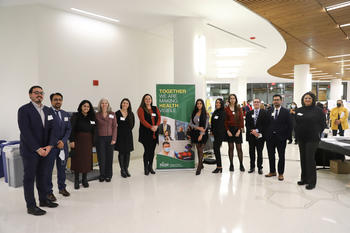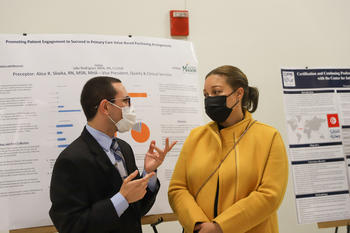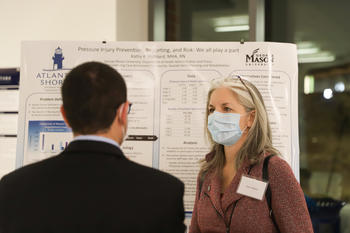MHA alumni credit their capstone internship and research experiences with preparing them for their careers in health administration.

For students who want to solve real-world health care problems like helping a hospital system create a disaster management plan or developing a security plan for a location health department, Mason’s Master of Health Administration (MHA) in Health Systems Management program is the place to practice and gain those skills with guidance from professionals.
Whether in person or online, the MHA program culminates in a real-world capstone practicum project where students solve a health care problem for an organization or company they are interested in, all with the guidance of a preceptor who is a professional in the field. Projects have included improving a COVID-19 testing and vaccination initiative, creating an improved patient intake plan, creating a strategy to reduce falls at a senior living facility, identifying the impact a hurricane had on suicides in Puerto Rico, and developing an online dashboard for a medical center, among others.
Recent alumni from the program agree that the capstone, which comes at the end of two years of coursework, and the program provided them with well-rounded health care skills that have helped them succeed in their careers.
“My capstone project taught me to be confident in my skills. I knew my perceived worth at my place of employment already so chose to do my project at a different location. Meeting new people, networking, and collaborating to produce a project that was centered on their needs helped me realize that I can step out of my comfort zone and still be successful,” said Kathy Hubbard, MHA ’21, whose project assessed injury prevention at a retirement community.
The field-based capstone practicum provides students with the opportunity to demonstrate what they have learned in class and through faculty collaboration to key health care executives while conceptualizing, applying, analyzing, synthesizing, and evaluating information to inform an executive decision regarding a complex problem.
"The most important lesson I learned from my capstone is to ask ‘why’ and strive for better results for our patients and providers."
“The most important lesson I learned from my capstone is to ask ‘why’ and strive for better results for our patients and providers. I was able to completely change the way my team outreaches to patients and leveraged the data analysis in the project to improve the accuracy of our patient panel attribution, greatly improving our cost of care metrics,” said Jake Rodriguez, MHA ’21. For his capstone, Rodriguez’s looked at a health care system’s highest cost “unengaged” patients to improve preventative health outcomes and the total cost of care.

Capstone projects can help students prepare for their future jobs, and sometimes lead to a job after graduation. The projects always provide students with growth, development, and help them learn something new about health care or their desired specialty.
“The capstone opened my eyes to the world of data analytics and its critical role in the health care setting. [I developed] a relentless determination and will to seek out and create opportunities for professional development and personal enhancement,” said Rehan Saeed, who now works at his dream job as a staff consultant at Federal Advisory Partners.
Experienced Preceptors, Supportive Networks
From hospitals, health care clinics, and private practices to government agencies and departments of health, preceptors mentor students in all types of health care facilities and organizations in the private and public sectors. Each student identifies a mentor to help guide them to create a worthwhile project for the host organization and the student and support the student in their research.
“My preceptor was an experienced Registered Nurse (RN). She helped prepare me by giving me opportunities to ask questions but then challenged me to answer them through reflection. This was important to me because I truly believe there is more value in presenting a solution than a question in many circumstances,” said Hubbard, currently the RN Clinical Supervisor for the Internal Medicine Department at Eastern Virginia Medical School. “In health care, we know what the problems are, we have asked all the questions before and done the research again and again. Like the MHA program, my preceptor instilled in me a sense of urgency to create and implement the solutions to the problems we identified.”
Preceptors have included administrators at Inova Fairfax Hospital, Office of Strategic Policy, Mason and Partners Clinic, Sunrise Senior Living, National Institutes of Health, Medical University of South Carolina, Kaiser Permanente, Maryland Department of Health, and Healthcare Sustainability and Relief Effort, and many more.
Career-Ready and Always Learning

“The work I did throughout the MHA program triggered my interest in a career change toward consulting. I had always worked in administrative roles – HR, business management, operations. The capstone work pushed me harder toward the career change and I ultimately decided to ask for a position as a consultant [at my current company],” said Sara Hodgson, who is a double Mason alumna with an MHA and a Bachelor of Science in Health Systems Management. Hodgson is a partner at The Moran Company, a health care research and consulting firm. “It is a complete career switch, but one I am glad I made and perhaps would not have made (or been qualified for) without working through the MHA program and my capstone project.”
The MHA program and its capstone practicum prepare students to thrive in the field of health care as administrators in a variety of roles. Students leave the program ready to take on the challenges of health equity and the health care system.
“The best thing that I learned from my capstone is that there is still work to be done. Health care is an industry that is constantly evolving,” said Jose Vazquez, who currently works with the U.S. Army Corps of Engineers. He aims to be a health care administrator within the federal health care system. “Also, I learned that adaptability has to be crucial for health care professionals because in times of crisis we have to respond and provide concrete solutions to deliver the best care possible.”
And Mason students are prepared and excited to do the work.
Learn more about Mason’s on-campus MHA program. Learn more about Mason’s online MHA program.
